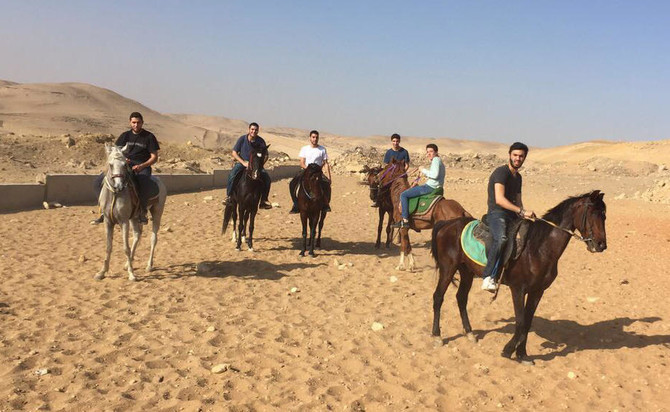CAIRO: Nothing says “Egypt” like the Great Pyramids of Giza. The monumental structures are the oldest of the Seven Wonders of the World, and are the only remaining wonder of the ancient world.
Visiting them ought to be a magical experience. In practice, it is anything but. It involves fending off aggressive vendors and scammers, and wading through litter.
With tourism improving for the first time since the 2011 revolution, Egypt has decided it must improve conditions around one of its main attractions and biggest money spinners.
A development project costing 400 million Egyptian pounds ($23 million) to modernize the infrastructure around the pyramids includes plans for a fleet of electric cars transporting visitors from the entrance of the archaeological complex to the pyramids every five minutes.
The planned transformation also involves closing off the Mena House entrance to the site, restricting entry to the Fayoum entrance, and connecting the pyramids to the Grand Egyptian Museum, which is scheduled to open later this year.
Mohammed Ismail, general supervisor for the development project, told Al-Masry Al-Yom newspaper that the electric vehicles will be driven on UNESCO-approved “yellow concrete suitable for the area.”
The current pyramid “experience” involves passing through a heavy security checkpoint, only to face a barrage of hawkers and conmen using the hardest of hard-sell techniques for overpriced souvenirs, tickets and camel rides.
Jumping in front of vehicles and jostling tourists on foot, they loudly insist they are the sole purveyors of entrance tickets, and the only way to the pyramids is by horse — their horse.
Signs state that rides should cost no more than 5 pounds, but the scammers often demand hundreds.
“I was taking photos, and a man appeared out of nowhere and shoved a scarf into my bag,” said Mike, a 30-year-old tourist from England.
“I tried to give it back to him, but he claimed I’d already taken it and had to pay for it. The police just watched, and I only managed to get away by forcing the scarf back into his hand and rushing off. He actually looked offended!”
Another tourist said: “We drove past some very heavy security, and all of a sudden our car gets charged by three men shouting at us and banging on the car. They pointed at us to pull over to the side, but our driver managed to get past them and speed off. It was quite scary really.”
Even after fending off the scammers outside the complex, there is little chance of visitors enjoying the pyramids in relative peace because there are more vendors inside.
Police officers, who are supposed to safeguard the complex and provide a reassuring presence for tourists, stand idly by.
One Egyptian who helped two tourists escape from persistent hawkers was attacked by one of them for “stealing away customers.” When he complained to the police, they accused him of soliciting tourists without a license.
The sight that greets visitors is nothing like the typical travel brochure vista of the pyramids rising majestically from vast expanses of pristine desert.
Instead, approaching the venerable ancient monuments means wading through a sea of modern detritus: Cigarette packets, drinks and snack wrappers. No wonder Ismail describes it as an “open zoo.”
Tourist numbers in 2017 were 55 percent up on the previous year, and hopes are high that they will be even better this year.
On Feb. 20, flights from Russia are set to resume for the first time since the downing in October 2015 of a Russian carrier that was flying passengers from Sharm El-Sheikh on the Red Sea to St. Petersburg.
The 400-million-pound redevelopment budget does not include funding for the electric car shuttles. “We are looking for a financier,” said Ismail.
But the fate of nuisance vendors and camel-ride scammers is sealed. They will be moved to an entirely separate area dedicated to horse-riding.
Pyramids clean-up plans to send scammers packing
Pyramids clean-up plans to send scammers packing

Israel’s settler movement takes victory lap as a sparse outpost becomes a settlement within a month

- Smotrich, who has been in charge of Israeli settlement policy for the past three years, has overseen an aggressive construction and expansion binge aimed at dismantling any remaining hopes of establishing a Palestinian state in the occupied West Bank
YATZIV SETTLEMENT, West Bank: Celebratory music blasting from loudspeakers mixed with the sounds of construction, almost drowning out calls to prayer from a mosque in the Palestinian town across this West Bank valley.
Orthodox Jewish women in colorful head coverings, with babies on their hips, shared platters of fresh vegetables as soldiers encircled the hilltop, keeping guard.
The scene Monday reflected the culmination of Israeli settlers’ long campaign to turn this site, overlooking the Palestinian town of Beit Sahour, into a settlement. Over the years, they fended off plans to build a hospital for Palestinian children on the land, always holding tight to the hope the land would one day become theirs.
That moment is now, they say.
Smotrich goes on settlement spree
After two decades of efforts, it took just a month for their new settlement, called “Yatziv,” to go from an unauthorized outpost of a few mobile homes to a fully recognized settlement. Fittingly, the new settlement’s name means “stable” in Hebrew.
“We are standing stable here in Israel,” Finance Minister and settler leader Bezalel Smotrich told The Associated Press at Monday’s inauguration ceremony. “We’re going to be here forever. We will never establish a Palestinian state here.”
With leaders like Smotrich holding key positions in Israel’s government and establishing close ties with the Trump administration, settlers are feeling the wind at their backs.
Smotrich, who has been in charge of Israeli settlement policy for the past three years, has overseen an aggressive construction and expansion binge aimed at dismantling any remaining hopes of establishing a Palestinian state in the occupied West Bank.
While most of the world considers the settlements illegal, their impact on the ground is clear, with Palestinians saying the ever-expanding construction hems them in and makes it nearly impossible to establish a viable independent state. The Palestinians seek the West Bank, captured by Israel in 1967, as part of a future state.
With Netanyahu and Trump, settlers feel emboldened
Settlers had long set their sights on the hilltop, thanks to its position in a line of settlements surrounding Jerusalem and because they said it was significant to Jewish history. But they put up the boxy prefab homes in November because days earlier, Palestinian attackers had stabbed an Israeli to death at a nearby junction.
The attack created an impetus to justify the settlement, the local settlement council chair, Yaron Rosenthal, told AP. With the election of Israel’s far-right government in late 2022, Trump’s return to office last year and the November attack, conditions were ripe for settlers to make their move, Rosenthal said.
“We understood that there was an opportunity,” he said. “But we didn’t know it would happen so quickly.”
“Now there is the right political constellation for this to happen.”
Smotrich announced approval of the outpost, along with 18 others, on Dec. 21. That capped 20 years of effort, said Nadia Matar, a settler activist.
“Shdema was nearly lost to us,” said Matar, using the name of an Israeli military base at the site. “What prevented that outcome was perseverance.”
Back in 2006, settlers were infuriated upon hearing that Israel’s government was in talks with the US to build a Palestinian children’s hospital on the land, said Hagit Ofran, a director at Peace Now, an anti-settlement watchdog group, especially as the US Agency for International Development was funding a “peace park” at the base of the hill.
The mayor of Beit Sahour urged the US Consulate to pressure Israel to begin hospital construction, while settlers began weekly demonstrations at the site calling on Israel to quash the project, according to consulate files obtained through WikiLeaks.
It was “interesting” that settlers had “no religious, legal, or ... security claim to that land,” wrote consulate staffer Matt Fuller at the time, in an email he shared with the AP. “They just don’t want the Palestinians to have it — and for a hospital no less — a hospital that would mean fewer permits for entry to Jerusalem for treatment.”
The hospital was never built. The site was converted into a military base after the Netanyahu government came to power in 2009. From there, settlers quickly established a foothold by creating makeshift cultural center at the site, putting on lectures, readings and exhibits
Speaking to the AP, Ehud Olmert, the Israeli prime minister at the time the hospital was under discussion, said that was the tipping point.
“Once it is military installation, it is easier than to change its status into a new outpost, a new settlement and so on,” he said.
Olmert said Netanyahu — who has served as prime minister nearly uninterrupted since then — was “committed to entirely different political directions from the ones that I had,” he said. “They didn’t think about cooperation with the Palestinians.”
Palestinians say the land is theirs
The continued legalization of settlements and spiking settler violence — which rose by 27 percent in 2025, according to Israel’s military — have cemented a fearful status quo for West Bank Palestinians.
The land now home to Yatziv was originally owned by Palestinians from Beit Sahour, said the town’s mayor, Elias Isseid.
“These lands have been owned by families from Beit Sahour since ancient times,” he said.
Isseid worries more land loss is to come. Yatziv is the latest in a line of Israeli settlements to pop up around Beit Sahour, all of which are connected by a main highway that runs to Jerusalem without entering Palestinian villages. The new settlement “poses a great danger to our children, our families,” he said.
A bypass road, complete with a new yellow gate, climbs up to Yatziv. The peace park stands empty.

















